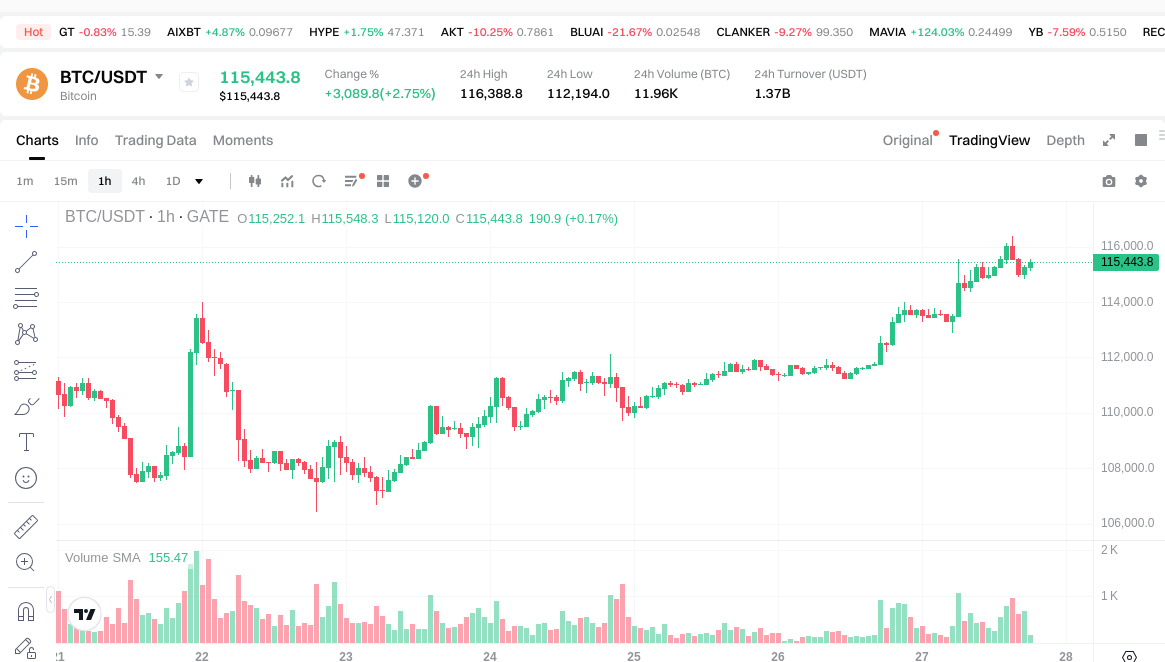Top 10 Global Cryptocurrency Platforms of 2025
2025 Global Top 5 Cryptocurrency Exchanges Ranking
In the era of digital economy sweeping across the globe, cryptocurrency exchanges have become crucial hubs connecting traditional finance with the blockchain ecosystem. According to the latest data from authoritative institutions, the number of active cryptocurrency users worldwide has surpassed 800 million, drawing significant attention to the comprehensive strength of leading trading platforms. Based on a multi-dimensional evaluation system, this article outlines the latest industry landscape:
1. Leading Global Exchange: Largest Trading Volume Provider
As the platform that has topped major exchange rankings for several consecutive years, this global leader maintains a stable daily trading volume of over $25 billion. Its innovative dual-track model of "blockchain ecosystem + centralized trading" has incubated more than ten sub-projects, including a native blockchain and NFT marketplace, with a global user base exceeding 300 million.
2. Technology Innovation Pioneer
Covering markets in over 200 countries and regions, this exchange continues to innovate in the field of derivative trading. The platform's newly launched "Unified Trading Account" system supports cross-product margin, increasing capital utilization efficiency to five times that of traditional exchanges. According to blockchain explorer data, its on-chain active addresses have grown by 37% quarter-over-quarter.
3. Rapidly Expanding Global Exchange
After completing its brand upgrade, this exchange has obtained digital asset licenses in multiple strategic locations. Its compliance team has expanded to over 300 members, with Q3 2025 seeing a 180% year-on-year increase in KYC-certified users and institutional investors accounting for over 40% of daily trading volume.
4. Top U.S. Compliant Platform
Known for its high user trust and regulatory compliance, this exchange has been a pioneer in working with U.S. authorities. It offers a wide range of services including spot trading, staking, and institutional-grade custody solutions.
5. European Market Leader
This exchange has established itself as a mainstream choice in Europe and America, focusing on security and compliance. It offers advanced trading features and has been at the forefront of integrating traditional financial services with cryptocurrency offerings.
Industry Development Trends
With the U.S. SEC having approved spot Bitcoin ETFs, compliance has become the core competitive track for exchanges. Recent data shows that compliance expenditure for the top exchanges increased significantly year-on-year, with platforms establishing comprehensive on-chain anti-money laundering systems.
 Notably, Middle Eastern sovereign wealth funds are actively deploying crypto asset custody businesses through regional regulatory authorities, potentially reshaping the industry's geographical landscape.
Notably, Middle Eastern sovereign wealth funds are actively deploying crypto asset custody businesses through regional regulatory authorities, potentially reshaping the industry's geographical landscape.
Conclusion
As the cryptocurrency market cap surpasses $3 trillion and Bitcoin price maintains its strong position above $100,000, choosing exchanges with transparent audit mechanisms, comprehensive risk control systems, and diverse financial products becomes crucial for stable investments. Investors are advised to comprehensively evaluate trading platforms that best suit their needs through simulated account experiences and liquidity tests. The evolving landscape of cryptocurrency exchanges reflects the rapid growth and increasing maturity of the digital asset industry, presenting both opportunities and challenges for investors in this dynamic market.
FAQ
Who holds the most BTC in the world?
Satoshi Nakamoto, Bitcoin's creator, is estimated to hold about 1.1 million BTC. MicroStrategy follows with nearly 600,000 BTC, while Tesla holds around 11,500 BTC.
What is the largest exchange in the world?
The largest exchange is determined by trading volume. As of October 2025, the top exchange has the highest 24-hour trading volume globally.
How many bitcoins does the Chinese government have?
The Chinese government holds approximately 190,000 bitcoins, based on the latest publicly available information as of 2025.
Share
Content